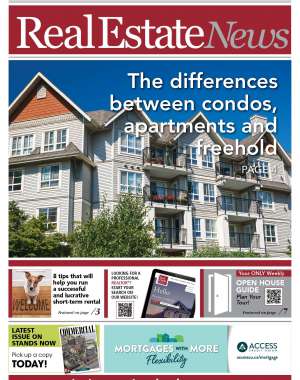Condos, apartments, co-ops, and freeholds. They can all feel somewhat similar yet they’re very different when it comes to the technicalities of how they’re run, and what they mean for tenants or owners.
We spoke with John Mark Wilderspin, a REALTOR® and residential and commercial salesperson with Century 21 Carrie Realty here in Winnipeg, to get his professional expertise on the differences between these types of properties when it comes to the definition of each space, as well as ownership, maintenance, renovations, fees and taxes.
Definitions and ownership
Short for “condominium,” a condo is a private residence within a community of other units. The interior of a condo unit is singularly owned (by a person, couple, two friends, etc) whereas common areas such as elevators, pools and parking are shared jointly by all owners.
An apartment is similar to a condo in that it’s a unit within a larger residential building. This can be a high-rise or low-rise, as well as an apartment within a house. Wilderspin explains an apartment is different from a condo because the entire building only has one owner whereas a condo building has many owners. Apartments are only for rent, whereas condos and freeholds can be purchased or rented. In rare cases, individuals can purchase units in an apartment building if the owner has performed a strata conversion.
Wilderspin says with a strata conversion, “a building owner can turn one title into many titles, which makes it possible to sell individual units.”
Other than this option, most corporation-owned apartment buildings are often sold just to other medium-to-large corporations or REITs (Real Estate Investment Trust).
Have you ever wondered about co-op ownership? Essentially when you buy a co-op, you’re not buying any land. Rather, you’re buying shares in a corporation that owns the property which grants you access to a unit to live in. Mortgages for co-ops can be more difficult to get than a condo or freehold because there’s no tangible land. With that being said, there are many banks and credit unions where would-be co-op buyers can find financing.
Freehold homeownership is when you own the land and structure, and there are no communal areas. Often when we think of freehold houses, we imagine detached and semi-detached homes, but townhouses can be freehold as well. A townhouse is a multi-floor home that shares one or two walls with adjacent properties. Townhomes are an outlier because they can be both freehold or part of a condo corporation.
Maintenance and renovations
Wilderspin says that with freehold homes, “maintenance is completely taken care of by the owner, who has more freedom to choose what companies they’d like to perform the work and at what cost.”
With a freehold home, you may need to have extra money saved to cover the cost of major repairs such as HVAC repairs or upgrades, and the roof. If something goes awry, you’re the one who needs to fix it. By the same token, you can do any renovations you’d like — provided they’re legal and you have the proper permits.
With condos and co-ops, there are corporate regulations that guide what you can do in terms of upgrades, replacements and renovations. Typically, if you want to do upgrades to your personal unit, you have to get written approval from the condo or co-op corporation.
“With a condo development, you’re paying your portion for everyone’s repairs,” says Wilderspin. “There’s more risk because different owners have different expectations. For instance, some owners might want to improve the lobby but you don’t, but because of a voting system, the condo is going to go with the majority.”
In an apartment, usually tenants have to get written permission from their landlord to do any renovations — if they’re allowed to do any to begin with. Renters who would like to make changes could potentially split the bill with their landlord. Interior and exterior repairs and maintenance are taken care of by the property management company or landlord that runs the building or unit at no cost to the renter.
Fees and taxes
When it comes to fees and taxes, owners of condos and freehold homes pay property tax. Municipal offices typically offer various structures to pay whether monthly, quarterly or yearly.
Condo owners also have to pay monthly maintenance fees, whereas freehold owners do not. Condo fees are often due at the beginning of each month. Tenants in apartments do not have to pay maintenance fees or property tax.
There are many different ways to be a tenant in Canada. The most important thing to consider is what type of home works for you and what you’re looking for. Tenants residing in an apartment or condo share similar experiences because they are places where you can “lock it and leave”. Freehold offers more choice and freedom, but also requires more time and money.
Whatever you choose, it’s always good to know the details about each type of dwelling. Reaching out to a local REALTOR® as you embark on your search can help provide peace of mind and useful context when looking at properties.
—
Realtor.ca



